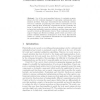Free Online Productivity Tools
i2Speak
i2Symbol
i2OCR
iTex2Img
iWeb2Print
iWeb2Shot
i2Type
iPdf2Split
iPdf2Merge
i2Bopomofo
i2Arabic
i2Style
i2Image
i2PDF
iLatex2Rtf
Sci2ools
121
click to vote
CP
2004
Springer
2004
Springer
Constraint-Based Combinators for Local Search
Abstract. One of the most appealing features of constraint programming is its rich constraint language for expressing combinatorial optimization problems. This paper demonstrates that traditional combinators from constraint programming have natural counterparts for local search, although their underlying computational model is radically different. In particular, the paper shows that constraint combinators, such as logical and cardinality operators, reification, and first-class expressions can all be viewed as differentiable objects. These combinators naturally support elegant and efficient modelings, generic search procedures, and partial constraint satisfaction techniques for local search. Experimental results on a variety of applications demonstrate the expressiveness and the practicability of the combinators.
Constraint Combinators | Constraint Programming | CP 2004 | Programming Languages | Rich Constraint Language |
Related Content
| Added | 01 Jul 2010 |
| Updated | 01 Jul 2010 |
| Type | Conference |
| Year | 2004 |
| Where | CP |
| Authors | Pascal Van Hentenryck, Laurent Michel, Liyuan Liu |
Comments (0)

